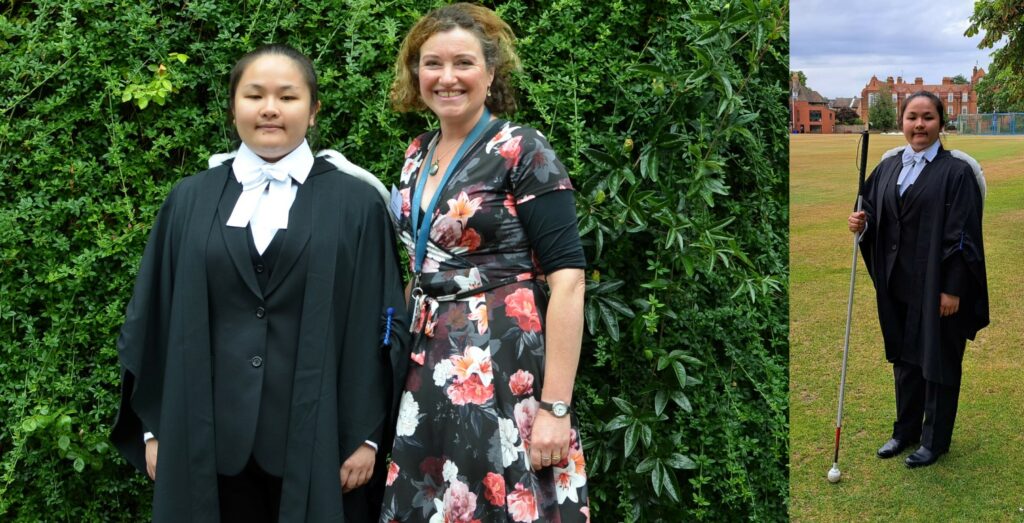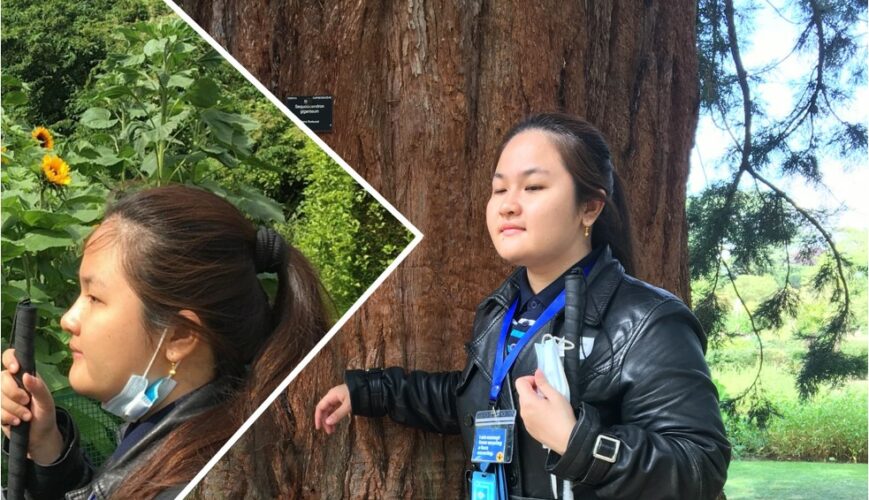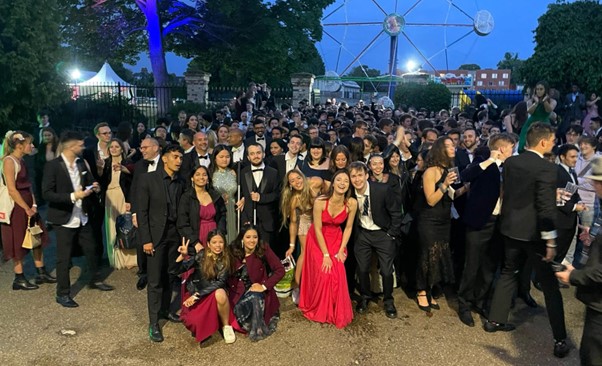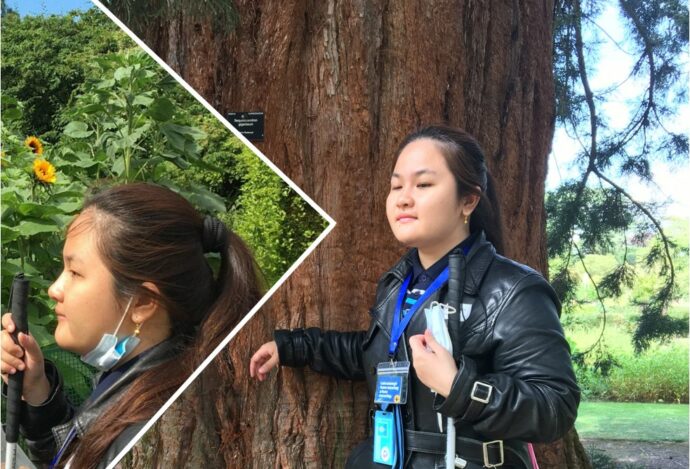Student Celine and tutor Alison recall the highs and lows of doing law at Cambridge. In a global pandemic. When you’re blind.
During what became a journey of discovery for both tutor and tutee, they share some of what they learnt – about themselves, each other, the university, and the city (and its ancient uneven pavements)!
Fully-blind since the age of five, Celine Lean Yew Lin is from Selangor in Malaysia, and came to Hughes Hall to study for a BA in Law. Her Tutor, Hughes Hall By-Fellow and College Disability Champion, Alison Nicholson, recently caught up with alumna Celine to reflect on their shared experiences and how Celine’s life has changed since graduating from Cambridge.

“I shall remember my time at Hughes Hall with great fondness” – Celine at her graduation; with Tutor Alison and in front of Hughes Hall.
So, you graduated and left Hughes Hall in 2022, what are you doing now?
I am currently working in a graduate programme for my scholarship provider, Khazanah Nasional Berhad. It is a management training programme – in a leading Malaysian waste resource management company called Cenviro. Working in the waste management sector is not quite what I pictured myself doing but it is, after all, a form of environmental service and therefore, I reason, an important contribution – albeit by a bit of a stretch – towards sustainability and human rights (which is where my real interest lies).
I know you found your time at Hughes immensely rewarding. But you started at Cambridge in 2019 and for much of that time life was hugely affected by the pandemic.
Yes, I remained in Cambridge whilst many students were able to return home and the college site was certainly very quiet! But the Porters and welfare staff were great, as were you as my tutor – everyone really went above and beyond in supporting me throughout it all.
And aside from the obvious impacts around isolation and loneliness, what were some of the other challenges you faced?
Having been at boarding school, I was used to being self-sufficient, and fiercely so. However, I did find online supervisions a real challenge. Trying to listen in and contribute to group discussion, whilst taking notes at the same time, and keeping an eye on the group chat meant a lot of juggling! And for much of the lockdown period, it felt like I was living in a completely virtual world. Like other students, I feel like I would have benefited so much more from live interactions you get with your fellow students during non-pandemic times – casually debating various lines of academic thoughts, whilst walking down the street to supervisions, for instance.
Moreover, the pandemic lockdowns meant I missed out on a great deal of extra-curricular activities. Being fully blind, I rely far more on everyday, in-person contact so was more vulnerable than most during times of strict social restrictions. The activities open to me were very limited. For example, I couldn’t continue with archery, as it would mean being too close (for social distancing) to a spotter; an able-bodied guide for archery. And my much anticipated ski trip didn’t happen which was a real shame!

“Standing in front of a huge redwood tree I knew exactly how tall it was – it felt like I was standing in front of a huge, vast wall.” Cambridge University’s beautiful Botanic Gardens became a treasured escape for Celine who, with Alison, could enjoy the sights, smells and sounds from one another’s perspectives.
Exams are no one’s favourite, and were particularly affected during the pandemic – what did this mean for you as a blind student?
With appropriate adjustment, I was allowed a longer window for each exam. But this made for a very tough and intense exam period – it felt like a marathon. And it didn’t help that I got COVID during the Easter vacation. The online exam format presented very specific difficulties to me too as the cover sheets and exam questions were presented as pdfs, which are just not accessible to a fully blind person.
I cannot emphasise enough how critical it is for universities to present material using accessible formats.
Were there any other surprising challenges the pandemic presented?
Yes! Mask wearing was particularly difficult for me as it partially hinders my sense of echo location. With a total loss of sight, I am more reliant on my other senses, and I found I was bumping into things more frequently, because the presence of a face mask makes it feel like there is something in the way of my spatial perception.
Do you remember, you commented on my heightened senses during a visit to the Botanic Gardens. Standing in front of a huge redwood tree I knew exactly how tall it was – it felt like I was standing in front of a huge, vast wall. That same visit, whilst sitting in the rose garden, I became aware of a very loud insect buzzing around in the grass – however you couldn’t see it to tell me what it was, let alone hear it – which we both found amusing. While wearing a mask does not technically decrease my ability to hear these things, it does cause these sensations to be muted, as there is some additional material in my space.
I also struggled with barriers to information during the pandemic. There was suddenly a lot a new, often urgent, and quite last minute information flying around! Sadly, some of that was inaccessible to me. For example, a corridor I needed to access in my accommodation block was under quarantine for a short time, however I had no idea. It turned out that there was a huge printed sign outside the doors to the corridor but, of course, I walked straight past it!
Of course, I understand that there was a lot going on, and everyone was doing their best at a time of heightened anxiety over COVID, but it was at times like these more than any that accessible communication was critical for me.
What were the challenges that you faced in terms of access to academic resources?
The introduction of MFA (Multifactor Authentication) threw up a huge challenge, and I spent so many hours in the I.T office trying to set up the necessary security steps! Timely preparation for supervisions was another challenge, due to the immense volume of materials that the Law course entails.
But the University Accessibility and Disability Resource Centre (ADRC) allocated a support worker who helped source and sort reading material ahead of time which was a real help, not to mention the immeasurable efforts, creativity and hard work you and my Directors of Studies put into ensuring necessary adjustments were in place for me.

At last! The 2022 Hughes Hall May Ball was welcome after the challenges of COVID restrictions; and a fitting celebration for Celine after meeting her own challenges on the journey to graduation (Celine is towards the front, just left of centre).
There are always lessons to be learned – is there anything further college could have done to have recognised and supported students with a physical disability?
Yes, I think a representative of disabled persons on the MCR committee at Hughes Hall would be a welcome addition to the welfare roles. The representative could not only give a voice to the specific rights and interests of disabled persons, but they could prioritise an accessible and inclusive society in our beloved College.
And, from Tutor Alison’s perspective, did supporting and getting to know Celine during her three years in Cambridge teach you anything?
I learnt such a lot from Celine – I don’t really know where to begin! When Celine arrived and started to orientate herself by practicing her walking routes, particularly over to the Law Faculty, I started to view our beautiful city in a very different light! And through different eyes.
I became increasingly aware of the uneven cobbles, the multiple potholes, trees planted in the middle of pavements, bikes carelessly left/locked up in random places…as for Hobson’s conduit, the open water drainage system running along Trumpington Road…Celine stumbled into this a few times!
In fact, since then we have made even more improvements to the College environment in terms of its wider accessibility (see here: reflecting on accessibility at Hughes).
And there were some very specific things I learnt. For example, finding out about the app ‘Be my Eyes’ was a revelation and I was very happy to sign up to it as a responder. The app connects people needing sighted support with volunteers and companies anywhere in the world, through live video and artificial intelligence. Celine uses it occasionally, and it has helped her out of some potentially tricky situations. Through the app I’ve been able to assist with anything from checking the date on food products, confirming whether colours match in an outfit, to finding exit buttons on doors or lifts, and helping with lateral flow test results during the pandemic.
The local charity Camsight was also brilliant when Celine first arrived, offering orientation sessions and helping us to assess the college site and her accommodation provision, according to her specific needs.
Final reflections, Alison?
Celine’s journey as a Cambridge undergraduate was, I believe a huge learning experience for both of us. Although fiercely independent, Celine gradually learnt to accept the support on offer for students with disabilities, particularly around exam adjustments and practical help offered by the ADRC. I am grateful for the learning journey Celine took me on, giving me some insight into the day to day realities, challenges (and rewards) of being a fully blind student.
And, Celine?
Only to say I shall remember my time at Hughes Hall with great fondness. I hope the College community will look at including a disability representative within MCR’s welfare function – I think this would make a huge difference.
Coming up
College members interested in disability issues may be interested in attending the Kirsty Wayland Memorial Disability Lecture entitled ‘Unleashing Potential: Perspectives on ADHD and Higher Education’ and taking place on Thursday 18th April at St John’s College, Cambridge (Palmerston Room, Fisher Building).
It will start at 5.30 pm (doors open at 5:00 pm) and end at 6.30 pm including a short question and answer session. The lecture is free and open to all. You can reserve a place by following this link.
Get involved
Our Head of Welfare, Dr Benjamin Marshall, as Disability Liaison Officer for Hughes and working closely with the ADRC, is always pleased to hear from any students who need support with getting relevant adjustments made. Alison looks forward to hearing from those in the college community who have an interest in helping take forward positive, inclusive initiatives, whether these be campaigning on a particular issue, awareness raising events, or suggesting practical changes. If you would like to get involved in improving accessibility at Hughes Hall or have any ideas or suggestions, please contact Alison on anicholson@hughes.cam.ac.uk.
For more information
- Our main College Disability and Access page
- For more on accessibility arrangements for students
- An overview of welfare support at Hughes Hall
- The comprehensive AccessAble Access Guide to Hughes Hall
- the University Accessibility and Disability Resource Centre (ADRC)
- ADRC’s information for disabled students on applying to Cambridge
- Details of our Tutors, including those with specific support and champion roles.
15.4.24





